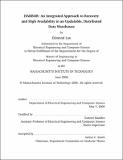| dc.contributor.advisor | Samuel Madden. | en_US |
| dc.contributor.author | Lau, Edmond, M. Eng. Massachusetts Institute of Technology | en_US |
| dc.contributor.other | Massachusetts Institute of Technology. Dept. of Electrical Engineering and Computer Science. | en_US |
| dc.date.accessioned | 2007-05-16T15:22:43Z | |
| dc.date.available | 2007-05-16T15:22:43Z | |
| dc.date.copyright | 2006 | en_US |
| dc.date.issued | 2006 | en_US |
| dc.identifier.uri | http://dspace.mit.edu/handle/1721.1/36800 | en_US |
| dc.identifier.uri | http://hdl.handle.net/1721.1/36800 | |
| dc.description | Thesis (M. Eng.)--Massachusetts Institute of Technology, Dept. of Electrical Engineering and Computer Science, 2006. | en_US |
| dc.description | This electronic version was submitted by the student author. The certified thesis is available in the Institute Archives and Special Collections. | en_US |
| dc.description | Includes bibliographical references (p. 99-105). | en_US |
| dc.description.abstract | Any highly available data warehouse will use some form of data replication to ensure that it can continue to service queries despite machine failures. In this thesis, I demonstrate that it is possible to leverage the data replication available in these environments to build a simple yet efficient crash recovery mechanism that revives a crashed site by querying remote replicas for missing updates. My new integrated approach to recovery and high availability, called HARBOR (High Availability and Replication-Based Online Recovery), targets updatable data warehouses and offers an attractive alternative to the widely used log-based crash recovery algorithms found in existing database systems. Aside from its simplicity over log-based approaches, HARBOR also avoids the runtime overhead of maintaining an on-disk log, accomplishes recovery without quiescing the system, allows replicated data to be stored in non-identical formats, and supports the parallel recovery of multiple sites and database objects. To evaluate HARBOR's feasibility, I compare HARBOR's runtime overhead and recovery performance with those of two-phase commit and ARIES, the gold standard for log-based recovery, on a four-node distributed database system that I have implemented. | en_US |
| dc.description.abstract | (cont.) My experiments show that HARBOR incurs lower runtime overhead because it does not require log writes to be forced to disk during transaction commit. Furthermore, they indicate that HARBOR's recovery performance is comparable to ARIES's performance on many workloads and even surpasses it on characteristic warehouse workloads with few updates to historical data. The results are highly encouraging and suggest that my integrated approach is quite tenable. | en_US |
| dc.description.statementofresponsibility | by Edmond Lau. | en_US |
| dc.format.extent | 105 p. | en_US |
| dc.language.iso | eng | en_US |
| dc.publisher | Massachusetts Institute of Technology | en_US |
| dc.rights | M.I.T. theses are protected by copyright. They may be viewed from this source for any purpose, but reproduction or distribution in any format is prohibited without written permission. See provided URL for inquiries about permission. | en_US |
| dc.rights.uri | http://dspace.mit.edu/handle/1721.1/36800 | en_US |
| dc.rights.uri | http://dspace.mit.edu/handle/1721.1/7582 | |
| dc.subject | Electrical Engineering and Computer Science. | en_US |
| dc.title | HARBOR : an integrated approach to recovery and high availability in an updatable, distributed data warehouse | en_US |
| dc.title.alternative | Integrated approach to recovery and high availability in an updatable, distributed data warehouse | en_US |
| dc.type | Thesis | en_US |
| dc.description.degree | M.Eng. | en_US |
| dc.contributor.department | Massachusetts Institute of Technology. Department of Electrical Engineering and Computer Science | |
| dc.identifier.oclc | 79653535 | en_US |
